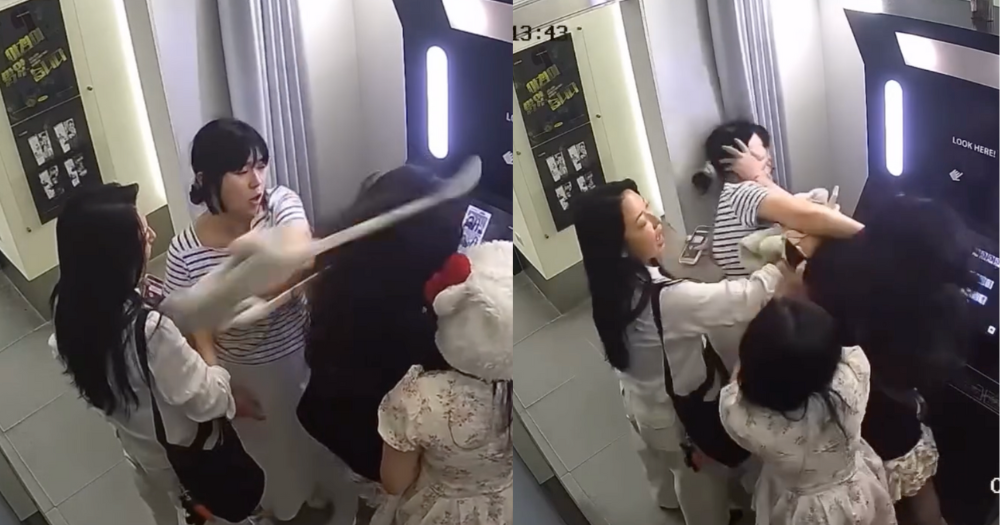Tensions Flare in Hanoi: Korean Tourists Accused of Assaulting Locals Inside Photobooth Amid Cultural Frictions and Tourism Recovery

Introduction
As Vietnam continues to re-establish itself as a major tourist destination in Southeast Asia post-pandemic, issues involving visitor behavior and cross-cultural understanding have become increasingly important. A recent incident in Hanoi involving two South Korean tourists and two local Vietnamese women has captured national attention, igniting debates on public conduct, tourism etiquette, and safety in shared public spaces.
What began as a minor disagreement inside a popular photobooth venue quickly turned into a viral confrontation, allegedly involving physical aggression. This article will explore the details of the incident, reactions from the public and authorities, its broader cultural implications, and what it means for Vietnam’s growing tourism industry.
The Incident: What Happened?
On the evening of July 11, 2025, two Vietnamese women visited a photobooth in Hanoi’s Tu Liem District. The venue is a trendy spot popular among locals and tourists for taking themed group photos. According to the Vietnamese women, they were in the booth during their reserved session time when two South Korean tourists outside began shouting at them to finish quickly.
Despite being within their allotted time, the situation escalated rapidly. One of the Korean women reportedly entered the booth, grabbed one of the Vietnamese women by the hair, and physically assaulted her with punches and kicks. The second Vietnamese woman, attempting to help her friend, was allegedly restrained and verbally threatened by the second Korean tourist.
No staff member intervened at the time, according to the victims, though security cameras were said to have captured the entire incident. Other bystanders also filmed parts of the altercation, which later spread widely on Vietnamese social media.
The victims claim that the assaulted woman now suffers from lingering physical and psychological trauma, including headaches, body pain, difficulty eating solid food, and emotional distress.
Official Response
Following the public outcry, Hanoi authorities launched an investigation into the event. Law enforcement from the Tu Liem district confirmed they were reviewing surveillance footage and gathering witness statements. As of mid-July, efforts were underway to identify the South Korean women, who reportedly left the venue immediately after the incident.
Authorities encouraged any witnesses or those with footage to come forward. The photobooth’s owner is said to be cooperating with officials, providing relevant video material.
While charges had not yet been officially filed at the time of writing, calls for accountability from the public and local officials have grown louder, urging the government to ensure tourist behavior remains respectful of local customs and laws.
Public Reaction and Cultural Discourse
The incident triggered widespread discussion online, not just about this specific altercation but about broader patterns of behavior sometimes observed in tourist-heavy areas. Many netizens expressed frustration, noting that some foreign visitors exhibit impatience or a sense of entitlement when traveling, especially in popular Southeast Asian destinations.
While acknowledging that such behavior does not represent all tourists, many Vietnamese users emphasized the importance of mutual respect, especially when visiting another country. Others pointed out that similar incidents have occurred in neighboring countries, raising questions about how tourism is managed in relation to host communities.
Some South Korean netizens also weighed in, condemning the actions of the individuals involved and emphasizing that such behavior is unacceptable regardless of nationality. Many expressed concern that these incidents damage Korea’s reputation abroad and called for responsible tourism.
Broader Context: Korean Tourism in Southeast Asia
South Korean tourists are among the most active travelers in Asia, with Vietnam, Thailand, and the Philippines ranking high on their list of destinations. This demographic brings substantial economic benefits to local economies through spending on hotels, food, shopping, and entertainment.
However, with increased numbers also comes increased scrutiny. In recent years, incidents involving Korean tourists—both as victims and aggressors—have made headlines. In the Philippines, for example, rising concerns about safety have prompted government action after several high-profile crimes against Korean visitors. Authorities in those regions have responded with measures such as deploying Korean-speaking officers and enhancing patrols in tourist zones.
In Vietnam, where Korean culture is widely admired and Korean businesses are deeply integrated into the economy, relations between Korean visitors and locals have generally been positive. However, as tourism rebounds post-pandemic, frictions occasionally surface, particularly in shared public spaces like cafés, photobooths, and entertainment venues.
Lessons for Vietnam’s Tourism Industry
This incident underscores several challenges that must be addressed as Vietnam continues to promote tourism:
1. Cultural Sensitivity Training for Tourists
Promoting respectful behavior through cultural orientation programs can help bridge misunderstandings. Airlines, hotels, and tour operators can include basic etiquette guidelines for visitors. For example, emphasizing punctuality, queueing norms, and personal space expectations might help prevent avoidable tensions.
2. Improved On-site Management
In tourist-heavy venues like photobooths or themed cafés, staff training should include conflict de-escalation and a clear process for managing disputes. In this case, staff presence or early intervention could have potentially prevented violence.
3. Legal and Accountability Measures
Local authorities must ensure swift investigations and visible consequences for unlawful behavior, regardless of the visitor’s nationality. Legal action not only delivers justice to victims but also sends a message that Vietnam is serious about maintaining public order and protecting its citizens.
4. Safe Tourism for All
The country’s tourism authorities could consider implementing a safety rating system for venues, or providing official accreditation to establishments that follow customer service and conflict-prevention best practices. This would reassure both locals and tourists.
Victim Support and Community Response
One of the most pressing concerns following such incidents is the well-being of the victims. Community groups, women’s organizations, and legal aid societies in Vietnam have voiced support for the women involved and called for increased attention to tourist-related altercations.
Mental health professionals have highlighted the importance of trauma counseling and the need for bystander education. Encouraging those who witness public aggression to speak up or intervene safely could reduce the number of incidents that escalate unchecked.
Toward a More Respectful Tourism Culture
Vietnam’s tourism slogan “Vietnam – Timeless Charm” reflects a vision of warmth, hospitality, and cultural richness. To protect that image, there must be clear expectations of how guests should behave and mechanisms to hold them accountable when they fail to do so.
Cultural misunderstandings can happen anywhere. But when they result in harm, silence cannot be an option. This incident has become more than a private dispute—it now stands as a symbol of what can go wrong in fast-moving, multicultural urban environments. Vietnam must respond thoughtfully, with both justice and foresight.
Moving Forward
While this incident may fade from the headlines, its legacy should not be ignored. For tourism to thrive, both visitors and locals must feel respected and safe. The industry, government, and civil society all have roles to play in shaping a tourism culture that is inclusive, lawful, and mutually enriching.
Vietnam has weathered many storms and continues to rise as a global destination. Ensuring that stories like this become rarer will require intention, cooperation, and systems that put dignity at the center of all visitor interactions.
Related Articles (for further reading):
Young Vietnamese Woman Claims Assault by Two South Korean Tourists Inside Hanoi Photobooth
Korean Tourists Involved in Photobooth Violence in Vietnam: A Wake-Up Call for Tourism Etiquette
Safety for Korean Tourists in Southeast Asia: Philippines, Vietnam Respond to Rising Incidents
Tourism and Public Conduct: When Culture Clashes Turn Physical
From K-Drama to Conflict: The Complex Relationship Between Korean Tourists and Southeast Asian Locals
News
Gerald Anderson Sets the Record Straight: Denies Rekindling Romance with Julia Barretto Amid Social Media Rumors (NH)
Gerald Anderson Sets the Record Straight: Denies Rekindling Romance with Julia Barretto Amid Social Media Rumors December 2, 2025…
Sibling Showdown: Eman Bacosa Faces Jimuel Pacquiao in an Epic Boxing Clash (NH)
Sibling Showdown: Eman Bacosa Faces Jimuel Pacquiao in an Epic Boxing Clash December 2, 2025 Introduction In the world of…
Jimuel Pacquiao Expected to Struggle Against Opponent, Says Disappointed Judge: Manny Pacquiao Feels Embarrassed (NH)
“Jimuel Pacquiao Expected to Struggle Against Opponent, Says Disappointed Judge: Manny Pacquiao Feels Embarrassed” December 1, 2025 Introduction The boxing…
Jinkee Pacquiao Drops Spicy Comment on Jillian Ward and Emman Bacosa Relationship: Social Media Ablaze (NH)
“Jinkee Pacquiao Drops Spicy Comment on Jillian Ward and Emman Bacosa Relationship: Social Media Ablaze” December 1, 2025 Introduction…
Netizen Regrets Handing Over Yu Menglong’s Clearest CCTV Footage to His Agency: Public Debate Erupts Online (NH)
“Netizen Regrets Handing Over Yu Menglong’s Clearest CCTV Footage to His Agency: Public Debate Erupts Online” December 1, 2025…
Sylvia Sanchez Nearly Melts with Joy at Zanjoe Marudo’s Heartwarming Gesture for Sabino’s Child (NH)
“Sylvia Sanchez Nearly Melts with Joy at Zanjoe Marudo’s Heartwarming Gesture for Sabino’s Child” December 1, 2025 Introduction In…
End of content
No more pages to load












